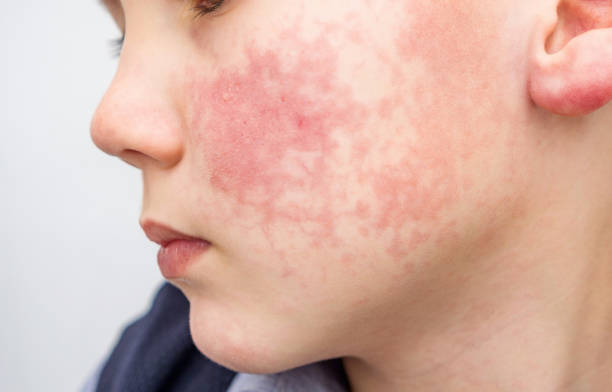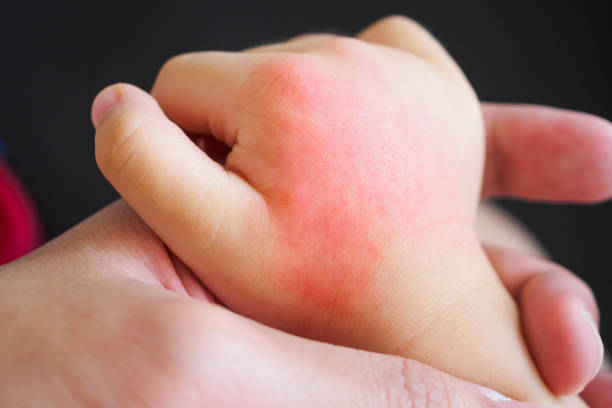WHAT ARE ALLERGIES?
Allergies happen when your immune system responds to a foreign substance like pollen, bee venom or pet dander, or food that does not cause a reaction in most people.
Your immune system produces substances called antibodies. When you have allergies, your immune system makes antibodies that identify a certain allergen as harmful, even though it is not. When you come into contact with the allergen, your immune system’s reaction could inflame your skin, sinuses, airways, or digestive system.
The severeness of allergies varies from person to person and could range from minor irritation to anaphylaxis a potentially life-threatening emergency. While most allergies cannot be cured, treatments could help relieve your allergy symptoms.

ALLERGIES CAUSES
Allergy symptoms, which depend on the substance involved, could affect your airways, sinuses and nasal passages, skin, and digestive system. Allergic reactions can be mild or severe. In some severe cases, allergies could trigger a life-threatening reaction called anaphylaxis.
Hay fever, also known as allergic rhinitis, could cause:
- Sneezing
- Itching of the nose, eyes, or roof of the mouth
- Runny, stuffy nose
- Watery, red, or inflamed eyes (conjunctivitis)
A food allergy could cause:
- Tingling in the mouth
- Inflammation of the lips, tongue, face, or throat
- Hives
- Anaphylaxis
An insect sting allergy could cause:
- A large region of inflammation (edema) at the sting site
- Itching or hives all over the body
- Cough, chest tightness, wheezing, or shortness of breath
- Anaphylaxis
A drug allergy could cause:
- Hives
- Itchy skin
- Rash
- Facial inflammation
- Wheezing
- Anaphylaxis
Atopic dermatitis, an allergic skin condition also known as eczema, could cause the skin to:
- Itch
- Redden
- Flake or peel
ANAPHYLAXIS SYMPTOMS
Some types of allergies, including allergies to foods and insect stings, could trigger a severe reaction called anaphylaxis. In a life-threatening medical emergency, anaphylaxis could cause you to go into shock. Signs and symptoms of anaphylaxis include:
- Loss of consciousness
- A drop in blood pressure
- Severe shortness of breath
- Skin rash
- Light-headedness
- A rapid, weak pulse
- Nausea and vomiting

WHEN SHOULD YOU SEE A DOCTOR?
You may see a doctor or primary care physician if you have symptoms you think are caused by an allergy, and over-the-counter (OTC) allergy medications do not provide enough relief. If you have symptoms after starting a new medication, call the doctor or primary care physician who prescribed it right away.
For a severe allergic reaction (anaphylaxis), call 911 or your local emergency number or look for emergency medical help. If you are using an epinephrine auto-injector (Auvi-Q, EpiPen, others), give yourself a shot right away.
Even if your symptoms improve after an epinephrine injection, you should go to the emergency department (ED) to make sure symptoms do not return when the effects of the injection wear off.
If you have had a serious allergy attack or any signs and symptoms of anaphylaxis in the past, make an appointment to see your doctor or primary care physician. Evaluation, diagnosis, and long-term management of anaphylaxis are complicated, so you will probably need to see a doctor or primary care physician who specializes in allergies and immunology.
WHAT CAUSES ALLERGIES?
An allergy begins when your immune system mistakes a generally harmless substance for a dangerous invader. The immune system then produces antibodies that stay on the alert for that certain allergen. When you are exposed to the allergen again, these antibodies could release a number of immune system chemicals, like histamine, that cause the allergy symptoms.
Common allergy triggers include:
- Airborne allergens, for example, pollen, animal dander, dust mites, and mold
- Specific foods, especially peanuts, tree nuts, wheat, soy, fish, shellfish, eggs, and milk
- Insect stings, like from a bee or a wasp
- Medications, especially penicillin or penicillin-based antibiotics
- Latex or other substances you touch, which could cause allergic skin reactions
ALLERGIES RISK FACTORS
You may be more likely to develop an allergy if you:
- Have a family history of asthma or allergies, like hay fever, hives, or eczema
- Are a child
- Have asthma or other allergic condition
ALLERGIES COMPLICATIONS
Having an allergy increases your risk of specific other medical problems, including:
- Anaphylaxis – If you have severe allergies, you are at increased risk of this severe allergy-induced reaction. Foods, medications, and insect stings are the most frequent triggers of anaphylaxis.
- Asthma – If you have an allergy, you are more likely to have asthma an immune system reaction that damages the airways and breathing. In various cases, asthma is triggered by exposure to an allergen in the environment (allergy-induced asthma).
- Sinusitis and infections of the ears or lungs – Your risk of getting these conditions is greater if you have hay fever or asthma.

ALLERGIES PREVENTION
Preventing allergic reactions depends upon the type of allergy you have. General measures include the following:
- Circumvent known triggers – Even if you are treating your allergy symptoms, try to avoid triggers. If, for example, you are allergic to pollen, remain indoors with windows and doors closed when pollen is high. If you are allergic to dust mites, dust, and vacuum and wash bedding usually.
- Maintain a diary – When trying to find out what causes or worsening of your allergic symptoms, monitor your activities and what you eat, when the symptoms happen, and what appears to be helpful. This might help you and your doctor or primary care physician identify triggers.
- Put on a medical alert bracelet – If you have had a severe allergic reaction, a medical alert bracelet (or a necklace) allows others to know that you have a severe allergy in case you have a reaction and you are not able to communicate.
ALLERGIES DIAGNOSIS
To evaluate whether you have an allergy, your doctor or primary care physician will likely:
- Ask detailed questions about signs and symptoms
- Perform a physical examination
- Have you maintain a detailed diary of symptoms and possible triggers
If you have a food allergy, your doctor or primary care physician will likely:
- Ask you to maintain a detailed diary of the foods you eat
- Ask if you have stopped eating the suspected food during the allergy evaluation
Your doctor or primary care physician may also recommend one or both of the following tests. Although, be aware that these allergy tests could be falsely positive or falsely negative.
- Skin test – A doctor or nurse will poke into your skin and expose you to small amounts of the proteins found in potential allergens. If you are allergic, you will likely develop a raised bump (hive) at the test location on your skin.
- Blood test – Certain IgE (sIgE) blood testing, frequently known as radioallergosorbent test (RAST) or ImmunoCAP testing, measures the amount of allergy-causing antibodies in your blood flow, called immunoglobulin E (IgE) antibodies. A blood sample or specimen is sent to a medical laboratory, where it could be tested for evidence of sensitivity to potential allergens.
If your doctor or primary care physician suspects your problems are caused by something other than an allergy, other tests may help find out or rule out other medical problems.

ALLERGIES TREATMENT
Allergy treatments include:
- Allergen avoidance – Your doctor or primary care physician will help you take steps to identify and avoid your allergy triggers. This is usually the most crucial step in preventing allergic reactions and reducing symptoms.
- Medications – Depending on your allergy, medications could help lower your immune system reaction and ease symptoms. Your doctor or primary care physician may suggest over-the-counter (OTC) or prescription medication in the form of pills or liquid, nasal sprays, or eyedrops.
- Immunotherapy – For severe allergies or allergies not completely relieved by other treatment, your doctor or primary care physician may suggest allergen immunotherapy. This treatment includes a series of injections of purified allergen extracts, generally given over a period of several years.Another form of immunotherapy is a tablet that is placed under the tongue (sublingual) till it dissolves. Sublingual medications are used to treat specific pollen allergies.
- Emergency epinephrine – If you have a severe allergy, you may need to carry an emergency epinephrine shot at all times. Given severe allergic reactions, an epinephrine shot (Auvi-Q, EpiPen, others) could reduce symptoms until you get emergency treatment.
If you or anyone you know is suffering from allergies, our expert providers at Zenith Injury Relief & Wellness Clinic will take care of your health and help you recover.
Call 972-210-0033 to schedule your appointment, and begin living your life pain-free.
